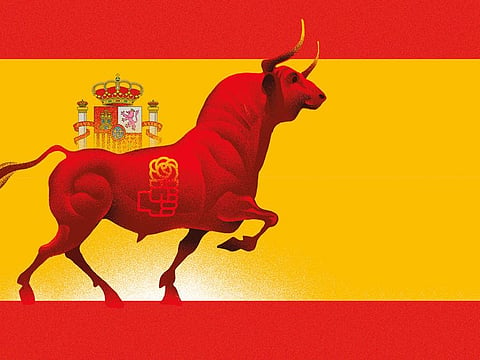How to look at socialist victory in Spain
A stronger centre-left bloc is expected to create more stability in a hung parliament

Spain’s Socialist Workers’ Party (Partido Socialista Obrero Espanol), known by their initials PSOE, are poised to form a government after voters delivered a hung parliament in last Sunday’s elections.
The vote comes at a crucial time for one of the Eurozone’s “big four” economies. Spain has made an impressive recovery from its sovereign debt crisis. Wracked by debt and recession, it has clawed its way back to something resembling a healthy position. Yet, the job is far from done. Unemployment remains stubbornly high, while growth is divided between urban hotspots and rural stragglers.
This significant yet still partial recovery is now threatened by a slump in much of the Eurozone. Italy is in recession, Germany’s industrial heartlands are struggling and France is riven by street protests.
Now PSOE has more seats in Spain and so gets first dibs at attempting to set up a stronger coalition. It is likely to include the harder-Left Podemos and a smattering of regional parties too.
Typically the uncertainty of a hung parliament is considered bad for the economy. Haggling between parties can throw up unexpected policies. Delays to the formation of a government can mean months of uncertainty ahead. Sure enough, markets fell, pulling shares down by around 0.75 per cent. This may be a fairly normal market reaction — but it does not mean the hung parliament is necessarily bad for the economy.
Angel Talavera at Oxford Economics anticipates only a “modest” impact. Look at the current state of growth. The backdrop is an extraordinary economic turnaround. Hit by the financial crisis and then the Eurozone debt crisis, Spain has worked hard to recover. In many ways it is paying off. Gross Domestic Product growth has outstripped Germany for the past four years and outpaced France and Italy for five years.
Unemployment has plunged. From the catastrophic peak in 2013 when more than a quarter of the workforce was jobless, the rate has been slashed almost in half.
The conservative People’s Party held power through much of this era, with its then-leader Mariano Rajoy serving as prime minister from 2011 until June 2018. But this bust-and-boom record was not enough to hold its electoral lead. This time the centre-Right party won only 66 seats compared to the Socialists’ 123, in the 350-seat parliament.
This suggests voters are happy enough to keep going with the party leading the coalition cobbled together a year ago.
The election result still delivered a highly fragmented parliament and it is unlikely to resolve Spain’s political fragility of the recent past. The resurgence of the Catalan crisis remains a risk, one that has weighed negatively on Spain’s rating recently. However, the relatively strong result for the centre-Left bloc may deliver slightly better government stability.
Very low base
There is plenty of reason to worry about a wobble right now. Swathes of southern Spain has jobless levels in the high teens or even above 20 per cent, meaning one in five people are out of work.
Spain’s recovery may be impressive, but the economic growth spurt comes from a very low base. Economists fear there will be no more action to free up the jobs market any further, passing up the chance to get unemployment down to below those historic levels. In fact unemployment rates are still high and the quality of employment is very poor. That is the one big challenge in the short term, but one is not very optimistic, because in the words of one expert, it has been 30 years of trying to fix it (the system) and there has not been a lot of progress.
If political uncertainty lasts for a long time, markets may begin to worry and charge the Spanish government a higher rate of interest to borrow money.
There are several risks out there. Sluggish growth in the rest of the Eurozone will weigh on Spain’s exports. The global picture is not much better, with clear hazards in China and even the United States.
It does not look like these election will throw Spain’s recovery off track, but risks in the world beyond it could.
— The Telegraph Group Limited, London, 2019
Tim Wallace is a senior columnist who specialises in economics and politics.
Sign up for the Daily Briefing
Get the latest news and updates straight to your inbox


